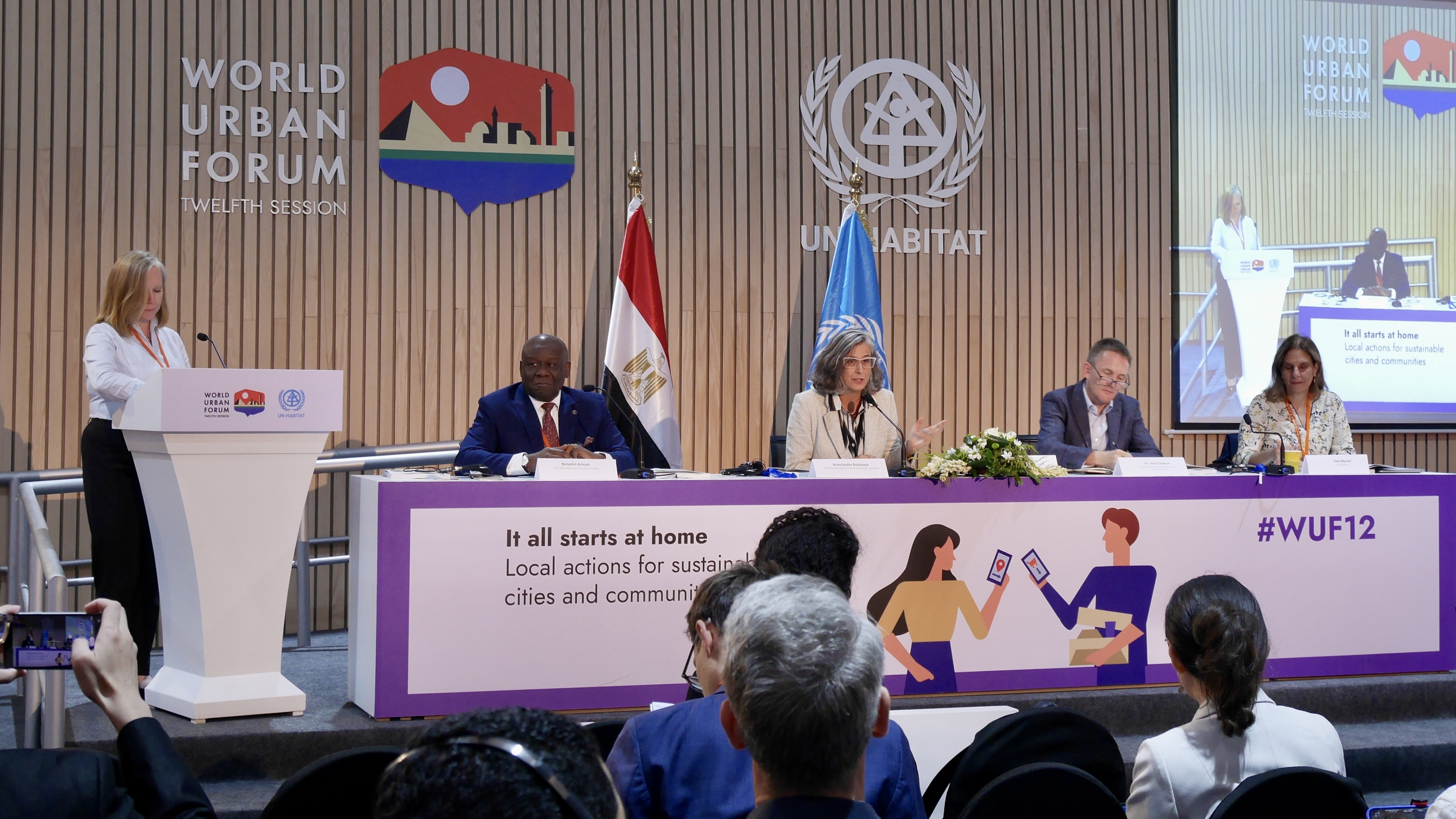Day 2 at WUF12: Housing, Climate Action, and a Vision for the Future
A map of the way forward
During a press conference, UN-Habitat Executive Director Anacláudia Rossbach launched the World Cities Report 2024: Cities and Climate Action. This flagship report, published every two years, examines the critical challenges of urbanization, and this edition shines a spotlight on the impact of climate change on cities.
“Cities are feeling the effects of climate change, but the impact is uneven, often hitting women disproportionately,” said Rossbach, underscoring the timeliness of the theme.
Eleni Myrivili, UN-Habitat’s Global Chief Heat Officer, emphasized the report’s importance, noting: “Now we have a map of the way forward.” She added that the report provides crucial data and design suggestions for managing extreme heat and other weather-related events.
The report’s findings highlight that urban areas often sit at the front lines of the climate crisis and are increasingly vulnerable to sudden shocks. As cities expand, their exposure grows, setting the stage for potentially catastrophic future impacts. Cities, the report argues, must be at the heart of global climate action.

“Cities are feeling the effects of climate change, but the impact is uneven, often hitting women disproportionately”
UN-Habitat Executive Director Anacláudia Rossbach
Housing at the core of urbanization
The day also marked the start of the WUF12 Dialogues, beginning with Dialogue 1: Housing Our Future. Opening the session, Rossbach noted how housing is at the core of UN-Habitat’s mandate. Stressing the urgency of addressing the housing crisis, she remarked: “We don’t have to have another generation of children born in slums.”
The panelists echoed her sentiment, recognizing housing as a fundamental human right. Marie-Josée Houle, Canada’s Federal Housing Advocate, affirmed: “The right to housing is, in fact, a human right—the most fundamental of all—and it’s deeply connected to all other rights.”
Building on this, Balakrishnan Rajagopal, UN Special Rapporteur on the Right to Adequate Housing, noted: “A major issue I observe is the vast gap between the recognition of the right to adequate housing as a human right and its proper realization.”
Cities on the climate frontline
Running parallel to the housing dialogue was Dialogue 2: Cities and the Climate Crisis, a session underscoring the connection between urban areas and climate action. Deputy Executive Director of UN-Habitat Michal Mlynár opened the session with a powerful reminder: “The impacts of climate change don’t fall equally. Women, children, and low-income communities are often the first to face the consequences.”
This dialogue, paired with the release of the World Cities Report, provided an in-depth exploration of how cities can both suffer from and combat climate change.
Carlos Moreno, an Associate Professor at the Paris IAE - Panthéon Sorbonne University, introduced the term “proxilience,” explaining: “Proximity is our strongest resilience in facing the dramatic challenges cities confront today. That’s why I propose a new term for the global community.”
Elizabeth Maruma Mrema, Deputy Executive Director of the UN Environment Programme (UNEP), sounded a note of caution, saying: “While cities are vulnerable to climate change, they also offer solutions. Yet, only 8 per cent of global climate mitigation and adaptation funding reaches them.”
Multilevel governance to drive the New Urban Agenda
Since 2020, the “One UN Roundtable” has provided a unique platform at WUF, bringing together the UN Development System to connect with partners who can support the UN’s work on strategies, policies, and programming—especially at the country level.
With seven Resident Coordinators and high-level UN representatives like Associate Administrator of the United Nations Development Programme (UNDP) Haoliang Xu and UNEP’s Elizabeth Maruma Mrema, this year’s Roundtable spotlighted the urgent need to close the financial gap for SDG localization. Xu shared insights from the Local2030 Coalition, explaining that “local authorities often lack a strong voice in international financing discussions. The UN can help by creating space for these local authorities to have a seat at the table.”
Don’t let it go to waste
In the afternoon, participants attended a special session on achieving a “Zero Waste World.” Attendees were invited to reimagine waste through an upcycled fashion show, accompanied by music from band Electro Zebala, known for creating North African beats with instruments crafted from waste.
Betty Osei Bonsu, Country Manager for the Green Africa Youth Organization, shared her personal journey to zero waste, inspired by her parents’ “no waste” philosophy. “Zero waste living isn’t just about reducing; it’s about innovating, creating, and transforming waste into something of value,” she said, encouraging the audience to rethink their approach to waste.
Youth: architects of the future
WUF12 continued to amplify youth voices. In the Youth and Children Roundtable, Immaya Pangket and Audrey Nicole Pahayahay from the Safe and Sound Cities Programme showcased their local project, which transformed a public space in Baguio City into a haven connecting people, animals, and nature.
“We must support our young people, making them part of decision and solution building,” Pangket emphasized. “The youth voice is no whisper—it’s powerful and must never be ignored.”
What’s Next?
Tomorrow, WUF12 will turn the spotlight on partnerships and financing localization. Stay tuned for more insights from diverse stakeholders, including a special session on G7. Follow our official WUF social media accounts and website for more vibrant highlights!
